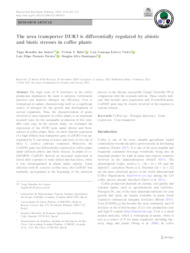The urea transporter DUR3 is differentially regulated by abiotic and biotic stresses in coffee plants.
The urea transporter DUR3 is differentially regulated by abiotic and biotic stresses in coffee plants.
Author(s): SANTOS, T. B. dos; BABA, V. Y.; VIEIRA, L. G. E.; PEREIRA, L. F. P.; DOMINGUES, D. S.
Summary: The high costs of N fertilizers in the coffee production emphasizes the need to optimize fertilization practices and improve nitrogen use efficiency. Urea is widespread in nature, characterizing itself as a significant source of nitrogen for the growth and development of several organisms. Thus, the characterization of genes involved in urea transport in coffee plants is an important research topic for the sustainable production of this valuable cash crop. In the current study, we evaluated the expression of the DUR3 gene under abiotic and biotic stresses in coffee plants. Here, we show that the expression of a high-affinity urea transporter gene (CaDUR3) was up-regulated by N starvation in leaves and roots of two out of three C. arabica cultivars examined. Moreover, the CaDUR3 gene was differentially expressed in coffee plants under different abiotic and biotic stresses. In plants of cv. IAPAR59, CaDUR3 showed an increased expression in leaves after exposure to water deficit and heat stress, while it was downregulated in plants under salinity. Upon infection with H. vastatrix (coffee rust), the CaDUR3 was markedly up-regulated at the beginning of the infection process in the disease susceptible Catuaí Vermelho 99 in comparison with the resistant cultivar. These results indicate that besides urea acquisition and N-remobilization, CaDUR3 gene may be closely involved in the response to various stresses.
Publication year: 2021
Types of publication: Journal article
Unit: Embrapa Coffee
Keywords: Gene expression, Nitrogen, Nutrient deficiencies, Transporters, Urea
Observation
Some of Embrapa's publications are published as ePub files. To read them, use or download one of the following free software options to your computer or mobile device. Android: Google Play Books; IOS: iBooks; Windows and Linux: Calibre.
Access other publications
Access the Agricultural Research Database (BDPA) to consult Embrapa's full library collection and records.
Visit Embrapa Bookstore to purchase books and other publications sold by Embrapa.

